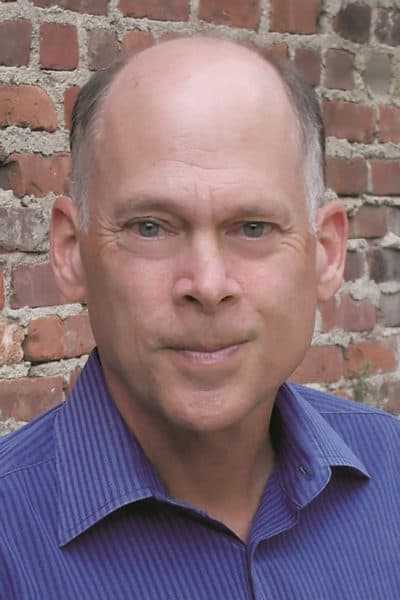Advertisement
'Waco Rising' explores how the siege in Waco continues to reverberate 30 years later
Resume
This year marks the 30th anniversary of Waco — the fiery deadly standoff between federal agents and members of the religious cult the Branch Davidians.
Led by David Koresh, the Branch Davidians were holed up in a compound on Mount Carmel outside Waco, Texas. On Feb. 28, 1993, agents from the Bureau of Alcohol, Tobacco and Firearms (ATF) raided the area after the Tribune Gazette reported sexual abuse, bigamy and weapons stockpiles at the compound.
Branch Davidians shot back. Four agents and six members of the group were killed. Then, hundreds of federal agents descended on the compound and began a 51-day siege that ended when the FBI raided the compound with tanks.
In the end, 76 Branch Davidians died, including more than 20 children, most fathered by Koresh.
Unspooling on TV, the events inspired many: Alex Jones, who built his empire on conspiracy theories about Waco, one young man who'd become the Oklahoma City bomber, and modern-day militias behind the Jan. 6 insurrection.

Author Kevin Cook dives deep into the siege and what happened after in his new book, "Waco Rising: David Koresh, the FBI, and the Birth of America's Modern Militias."
The Branch Davidians focused on the violence in the Book of Revelation and believed a final battle was coming with “Babylon,” the term members used to describe the FBI and ATF, Cook says.
And when government forces struck the compound, followers took the tanks rolling in as proof that their charismatic leader Koresh was right about the world ending before their eyes.
“The thing about Koresh was not really charisma. It was that he was able to make the Bible — the often confusing, often conflicting stories of the Bible — compelling to have great meaning to his followers,” Cook says. “His followers were sincerely religious. I happen to believe that David Koresh was a monster. What he did, I think, was to make his followers feel that they had a great role to play in the coming apocalypse.”
Book excerpt: 'Waco Rising: David Koresh, the FBI, and the Birth of America's Modern Militias
By Kevin Cook
Wandering Bonehead
Vernon Howell, who would later take the name David Koresh, was born in Houston on a sweltering morning in August 1959. His mother was fourteen years old.
Bonnie Clark told friends she was “sort of engaged” to the baby’s father. Bobby Howell was a high school senior, a good kisser with a pickup truck. Bonnie dropped out of eighth grade to have their baby. The age of consent was seventeen, but a fourteen-year-old Texan could marry with parental consent. “Daddy signed the papers, but Bobby backed out,” she remembered. “God had a plan for my life and Vernon’s life, which didn’t include Bobby.”
Bonnie gave her son his father’s name anyway. She named him Vernon Wayne Howell and raised him while working two or three jobs at a time. She waited tables. She worked in a nail salon. She cleaned houses and offices for a realtor. After a brief marriage to an ex-con who beat her, she lied about her age and worked as a waitress at a nightclub on a tumbledown block of Houston’s Canal Street. With its mirrored walls and green neon, the Jade Lounge seemed posh to her. “A lot of prostitutes hung around,” she recalled, “but they didn’t work out of there.”
The owner liked the lively new girl with the auburn hair. “My knight in shining armor,” she called Roy “Rocky” Haldeman, a burly navy vet, the sort of proprietor who could break up a bar fight or win one.
By the time they married in 1965, Roy was thirty-six. Bonnie was twenty and pregnant again. She delighted her new husband by giving birth to a boy they named Roger. Haldeman sold his share of the Jade Lounge and moved the four of them to a farm near Dallas.
He didn’t think much of his wife’s first kid. For one thing, five-year-old Vernon was so hyper that Bonnie called him “Sputnik.” For another, he stuttered. Worse yet, the boy was shaping up to be what his stepfather considered “a pussy.” He cried every time he got dropped off at day care. “Roy would tell him not to cry,” she recalled. “He said, ‘Be a man!’ Roy beat him on his butt and left it black and blue.” Thirty years later, Koresh described those beatings to an FBI negotiator. His stepfather spanked him so hard, he said, “he made me fly like a kite.”
School was no easier. The boy was dyslexic as well as hyperactive. Vernon flunked first grade twice. After that, a teacher told the eight-year-old he’d been assigned to special education, and for a moment he thought she meant he was special. Other kids disabused him of that notion by giving him a nickname: Mister Retardo. “When my mom picked me up after school that day,” he recalled, “I busted out howling, ‘I’m a retard!’”
His boyhood took a turn for the better on the day of a middle-school sports festival. Even the special-ed students were expected to compete in one event or another, so a coach entered Vernon in a cross-country race. “I didn’t know I could run fast,” he recalled of the day he won a blue ribbon. But Vernon and his half brother used to chase each other around Haldeman’s land. “We didn’t have bikes or expensive toys. We built up leg strength racing, so when I ran against them city boys, I ran ’em ragged.” He began to believe there might be something special about him, a touch of greatness.
He also had a God-given knack for shooting guns. Even Haldeman was impressed when his stepson drew a bead with a BB gun and hit squirrels between the eyes. As he grew his first whiskers, he developed other passions: for cars, girls, and, to Bonnie’s surprise, God. He owed his interest in religion to Bonnie’s mother, Erline Clark, a Seventh-day Adventist who took Vernon to Sabbath services in Tyler, Texas, and gave him his first Bible.
Seventh-day Adventists celebrate the Sabbath from sunset on Friday to sunset on Saturday, the Old Testament way. They believe human history will end soon with the Second Coming of Jesus. Vernon preferred the rigor and drama of his grandma’s religion to the chaos in the Haldemans’ house, where his mother and stepfather drank, fought, and split up only to kiss and make up to the sound of grunts and thumps in the bedroom next to his. When they were on the outs they’d send him to stay with his grandma for months at a stretch. It took Vernon a while to make sense of the old-timey language in the Bible she gave him, but once he got the hang of the thees, thous, and shalts he was pleased to find all sorts of violence and sex in its onion-skin pages. By the age of twelve, despite his struggles in school, he could recite long biblical passages from memory.
Haldeman was a mean drunk who got meaner and drunker with age. Finally, Bonnie left him. Vernon claimed she slept with men for money after that, but she swore it wasn’t so cut-and-dried as that. According to her, she paid their bills with help from “some rich boyfriends.”
Vernon dropped out of the ninth grade with a grade-point average he once described as “you don’t want to know.” But he was good with his hands. He worked construction and made tax-free money fixing cars, motorcycles, lawn mowers, and power tools. Good old Vern could take a backfiring engine apart and put it back together so it purred. He did carpentry for friends “just like Jesus,” said Bonnie, who cosigned for a Chevy pickup truck Vernon called his “chariot.” She felt bad about partying her way through his youth to the point that she forgot much of it, and for letting her men beat him. Still she saw a silver lining in what she called the “whuppings” he endured as a child, including some she dispensed herself. “As far as disciplining children, he learned from all the wrong things I did,” Bonnie said years later, when she became more religious. “I think God caused certain circumstances in his childhood for him to understand humanity.”
She recalled “Mary,” her son’s first girlfriend, as a raven-haired temptress. The girl had dark hair all right, but her name was Linda. Sixteen-year-old Linda Campion was the one who introduced eighteen-year-old Vernon to sex. “My first love,” he called her years later. “I was shy, still a virgin, and she was jailbait. We had the most beautiful relationship of carnal spirituality” in the bed of his pickup.
He didn’t believe in using condoms. The Bible warns men not to spill their seed. The Bible said sex could make a man and woman “one flesh,” not one flesh and a little bit of rubber. So he said a doctor had told him he could never have children. He was “sterile,” he told Linda, a word he’d heard in a movie.
He was startled when she told him she was pregnant. But the more he thought about it, the more he liked the idea. “I was blown away at the thought that I’d have a child,” he said. “Me, Mister Retardo—going to have a baby!”
Instead, Linda’s father paid for an abortion.
Vernon stayed away from the Campions for a month, sleeping in his truck down the road from Linda’s house. Finally, Dick Campion took pity on him. A middle manager at Texas Instruments, Campion wanted his daughter to be happy. “Stay with us,” he told the boy, who moved into Linda’s room and into her bed. Vernon considered their sleeping arrangements “weird. In the mornings her dad would knock on the door. ‘Linda, time to go to school! Vern, are you going to work?’”
Soon Linda was pregnant again. This time her father welcomed the news, rattling on about love and family and a church wedding—until Vernon started to apologize for his role in her abortion. “I didn’t know about it till after,” he blurted. “Oh man, did I feel like a murderer.”
Dick Campion’s face turned red. He hadn’t known who was responsible for Linda’s first pregnancy. She had blamed another boy.
“So he kicked me out.”
Vernon wasn’t ready to move back in with his mother or his grandmother. He went back to sleeping in his truck, looking up at God’s constellations, “talking to the heavens.” Those conversations could be a joy on clear nights but weren’t so inspiring when it rained. “I ended up cussing God out.”
He spent three years working construction and doing odd jobs, living here and there, crashing at his grandma’s now and then. He got kicked out of the Seventh-day Adventist church in Tyler, Texas—“disfellowshipped”—for having sex with a church elder’s fifteen-year-old daughter. He smoked Camels, drank beers he liked to call “suds,” and learned to play a guitar his mother bought him. “I taught myself to play before anybody ever tuned that guitar. Once it got tuned, I had to learn all over again.” He loved Elvis Presley, the Mamas & the Papas, Johnny Cash, and later Uriah Heep and Foghat. Vernon pictured himself as a rock star, but at the age of twenty-one he was still a nobody with no place to call home. “A wandering bonehead,” in his own estimation.
His wandering led him to a religious commune a hundred miles south of Dallas. The Branch Davidians, a splinter group of Seventh-day Adventists, lived there. On a dog-day morning in 1981, Vernon Howell drove up to their retreat ten miles east of Waco. He parked outside the chapel and went looking for Sister Roden.
Excerpted from "Waco Rising: David Koresh, the FBI, and the Birth of America's Modern Militias" by Kevin Cook, published on Jan. 31, 2023 from Holt/Metropolitan Books. Copyright © 2023 by Kevin Cook.
This segment aired on January 31, 2023.

